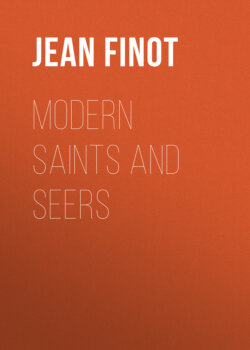Читать книгу Modern Saints and Seers - Jean Finot - Страница 8
На сайте Литреса книга снята с продажи.
PART I THE SALVATION OF THE POOR A. THE ORGANISED SECTS
ОглавлениеThe tragic death of the monk Rasputin made a deep impression upon the civilised world, and truth was lost to view amid the innumerable legends that grew up around his life and activities. One leading question dominated all discussions:—How could an individual so lacking in refinement and culture influence the life of a great nation, and become in indirect fashion one of the main factors in the struggle against the Central Powers? Through what miracle did he succeed in making any impression upon the thought and conduct of a social order infinitely superior to himself?
Psychologists are fascinated by the career of this adventurer who ploughed so deep a furrow in the field of European history; but in seeking to detach the monk from his background, we run the risk of entirely failing to comprehend the mystery of his influence, itself the product of a complex and little understood environment. The misery of the Russian people, combined with their lack of education, contributed largely towards it, for the desire to escape from material suffering drove them to adopt the weirdest systems of salvation for the sake of deliverance and forgetfulness.
The perception of the ideal is often very acute among the uneducated. They accept greedily every new "message" that is offered them, but alas, they do not readily distinguish the true from the false, or the genuine saint from the impostor.
The orthodox clergy of the old Russian régime, recruited under deplorable conditions, attained but rarely the moral and intellectual eminence necessary to inspire their flock with feelings of love and confidence; while, on the other hand, the false prophets and their followers, vigorously persecuted by official religion, easily gained for themselves the overwhelming attraction of martyrdom. Far from lessening the numbers of those who deserted the established church, persecution only increased them, and inflamed the zeal of its victims, so that they clung more passionately than ever to the new dogmas and their hunted exponents.
These sects and doctrines, though originating among the peasantry, did not fail to spread even to the large towns, and waves of collective hysteria, comparable to the dances of death of the Middle Ages, swept away in their train all the hypersensitives and neurotics that abound in the modern world. Even the highest ranks of Russian society did not escape the contagion.
We shall deal in these pages with the most recent and interesting sects, and with those that are least known, or perhaps not known at all. Beginning with the doctrines of melancholia, of tenderness, of suffering, of exalted pietism, and of social despair—which, whether spontaneous or inspired, demoniac or divine, undoubtedly embody many of the mysterious aspirations of the human soul—we shall find ourselves in a strange and moving world, peopled by those who accomplish, as a matter of course, acts of faith, courage and endurance, foreign to the experience of most of us.
These pages must be read with an indulgent sympathy for the humble in spirit who adventure forth in search of eternal truth. We might paraphrase on their behalf the memorable discourse of the Athenian statesman: "When you have been initiated into the mystery of their souls you will love better those who in all times have sought to escape from injustice."
We should feel for them all the more because for so long they have been infinitely unhappy and infinitely abused. Against the dark background of the abominations committed by harsh rulers and worthless officials, the spectacle of these simple souls recalls those angels described by Dante, who give scarcely a sign of life and yet illuminate by their very presence the fearful darkness of hell; or those beautiful Greek sarcophagi upon which fair and graceful scenes are depicted upon a background of desolation. These "pastorals" of religious faith have a strangely archaic atmosphere, and I venture to think that my readers will enjoy the contemplation of such virgin minds, untouched by science, in their swift and effortless communings with the divine.
The mental profundities of the moujik exhale sweetness and faith like mystic flowers opening under the breath of the Holy Spirit. In them, as in the celebrated Psychomachy of Prudence, the Christian virtues meet with the shadows of forgotten gods, Holy Faith is linked to Idolatry, Humility and Pride go hand in hand, and Libertinism seeks shelter beneath the veils of Modesty.
This thirst for the Supreme Good will in time find its appeasement in the just reforms brought by an organised democracy to a long-suffering people. Some day it may be that order, liberty and happiness shall prevail in the Muscovite countries, and their inhabitants no longer need to seek salvation by fleeing from reality. Then there will exist on earth a new paradise, wherein God, to use Saint Theresa's expression, shall henceforth "take His delight."
